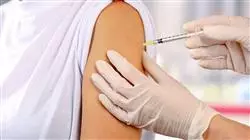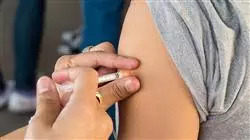University certificate
Scientific endorser

The world's largest faculty of nursing”
Introduction to the Program
With this 100% online Masters Degree, you will efficiently manage multiple vaccination programs, optimizing their implementation in the healthcare setting”

Vaccination is one of the greatest advancements in public health and a fundamental pillar in disease prevention. In fact, the World Health Organization warns that vaccine hesitancy is one of the main threats to global health, emphasizing the importance of having highly trained professionals in this field. In this context, specialists must update their knowledge to ensure safe, effective administration based on the best available scientific evidence.
Recognizing this need, TECH introduces the Masters Degree in Vaccines in Nursing, a university qualification designed to equip professionals with the most advanced tools in immunization. Through an updated, multidisciplinary approach, this academic opportunity covers everything from the composition and mechanisms of vaccines to strategies for increasing coverage across various populations. It also incorporates the latest advancements in mRNA vaccines, immunization in patients with complex conditions, and epidemiological control of outbreaks. The training will also include specific modules on vaccination communication, addressing how to counter misinformation and enhance public trust in immunizations.
Moreover, this university program has been designed to meet the needs of working professionals. Thanks to its innovative 100% online learning model, graduates will be able to progress at their own pace, with access to the latest studies and international recommendations. Additionally, the Relearning methodology is employed, optimizing knowledge retention through the strategic repetition of key concepts.
In this way, graduates will be prepared to play a key role in planning and managing vaccination programs, promoting prevention and public health with the utmost scientific rigor. A unique academic qualification that will make a difference in the careers of nursing professionals and in the protection of society.
You will implement vaccination policies that ensure compliance with health protocols, guaranteeing the effectiveness of immunization campaigns”
This Masters Degree in Vaccines in Nursing contains the most complete and up-to-date scientific program on the market. The most important features include:
- The development of practical cases presented by experts in Vaccines in Nursing
- The graphic, schematic, and practical contents with which they are created, provide scientific and practical information on the disciplines that are essential for professional practice
- Practical exercises where self-assessment can be used to improve learning
- Special emphasis on innovative methodologies in Vaccines in Nursing
- Theoretical lessons, questions to the expert, debate forums on controversial topics, and individual reflection assignments
- Content that is accessible from any fixed or portable device with an internet connection
You will design vaccination protocols based on scientific evidence, ensuring safe and effective administration across different populations”
The teaching staff includes professionals from the field of Vaccines in Nursing, who bring their work experience to this program, alongside renowned specialists from leading societies and prestigious universities.
The multimedia content, developed with the latest educational technology, will provide the professional with situated and contextual learning, i.e., a simulated environment that will provide an immersive learning experience designed to prepare for real-life situations.
This program is designed around Problem-Based Learning, whereby the student must try to solve the different professional practice situations that arise throughout the program. For this purpose, the professional will be assisted by an innovative interactive video system created by renowned and experienced experts.
You will acquire advanced knowledge in immunization, including the development and mechanisms of action of vaccines”

Thanks to the Relearning system used by TECH, you will reduce the long hours of study and memorization”
Why study at TECH?
TECH is the world’s largest online university. With an impressive catalog of more than 14,000 university programs available in 11 languages, it is positioned as a leader in employability, with a 99% job placement rate. In addition, it relies on an enormous faculty of more than 6,000 professors of the highest international renown.

Study at the world's largest online university and guarantee your professional success. The future starts at TECH”
The world’s best online university according to FORBES
The prestigious Forbes magazine, specialized in business and finance, has highlighted TECH as “the world's best online university” This is what they have recently stated in an article in their digital edition in which they echo the success story of this institution, “thanks to the academic offer it provides, the selection of its teaching staff, and an innovative learning method aimed at educating the professionals of the future”
A revolutionary study method, a cutting-edge faculty and a practical focus: the key to TECH's success.
The most complete study plans on the university scene
TECH offers the most complete study plans on the university scene, with syllabuses that cover fundamental concepts and, at the same time, the main scientific advances in their specific scientific areas. In addition, these programs are continuously being updated to guarantee students the academic vanguard and the most in-demand professional skills. In this way, the university's qualifications provide its graduates with a significant advantage to propel their careers to success.
TECH offers the most comprehensive and intensive study plans on the current university scene.
A world-class teaching staff
TECH's teaching staff is made up of more than 6,000 professors with the highest international recognition. Professors, researchers and top executives of multinational companies, including Isaiah Covington, performance coach of the Boston Celtics; Magda Romanska, principal investigator at Harvard MetaLAB; Ignacio Wistumba, chairman of the department of translational molecular pathology at MD Anderson Cancer Center; and D.W. Pine, creative director of TIME magazine, among others.
Internationally renowned experts, specialized in different branches of Health, Technology, Communication and Business, form part of the TECH faculty.
A unique learning method
TECH is the first university to use Relearning in all its programs. It is the best online learning methodology, accredited with international teaching quality certifications, provided by prestigious educational agencies. In addition, this disruptive educational model is complemented with the “Case Method”, thereby setting up a unique online teaching strategy. Innovative teaching resources are also implemented, including detailed videos, infographics and interactive summaries.
TECH combines Relearning and the Case Method in all its university programs to guarantee excellent theoretical and practical learning, studying whenever and wherever you want.
The world's largest online university
TECH is the world’s largest online university. We are the largest educational institution, with the best and widest online educational catalog, one hundred percent online and covering the vast majority of areas of knowledge. We offer a large selection of our own degrees and accredited online undergraduate and postgraduate degrees. In total, more than 14,000 university degrees, in eleven different languages, make us the largest educational largest in the world.
TECH has the world's most extensive catalog of academic and official programs, available in more than 11 languages.
Google Premier Partner
The American technology giant has awarded TECH the Google Google Premier Partner badge. This award, which is only available to 3% of the world's companies, highlights the efficient, flexible and tailored experience that this university provides to students. The recognition as a Google Premier Partner not only accredits the maximum rigor, performance and investment in TECH's digital infrastructures, but also places this university as one of the world's leading technology companies.
Google has positioned TECH in the top 3% of the world's most important technology companies by awarding it its Google Premier Partner badge.
The official online university of the NBA
TECH is the official online university of the NBA. Thanks to our agreement with the biggest league in basketball, we offer our students exclusive university programs, as well as a wide variety of educational resources focused on the business of the league and other areas of the sports industry. Each program is made up of a uniquely designed syllabus and features exceptional guest hosts: professionals with a distinguished sports background who will offer their expertise on the most relevant topics.
TECH has been selected by the NBA, the world's top basketball league, as its official online university.
The top-rated university by its students
Students have positioned TECH as the world's top-rated university on the main review websites, with a highest rating of 4.9 out of 5, obtained from more than 1,000 reviews. These results consolidate TECH as the benchmark university institution at an international level, reflecting the excellence and positive impact of its educational model.” reflecting the excellence and positive impact of its educational model.”
TECH is the world’s top-rated university by its students.
Leaders in employability
TECH has managed to become the leading university in employability. 99% of its students obtain jobs in the academic field they have studied, within one year of completing any of the university's programs. A similar number achieve immediate career enhancement. All this thanks to a study methodology that bases its effectiveness on the acquisition of practical skills, which are absolutely necessary for professional development.
99% of TECH graduates find a job within a year of completing their studies.
Master’s Degree in Vaccines in Nursing
It is fascinating to see how the simple act of learning new things can beneficially revolutionize the world. In the 18th century, physician Edward Jenner discovered on his own that dairymaids in rural England were immune to smallpox due to their contact with cows. This led him to develop a form of inoculation to combat the disease. Today, the medical science community greatly values his discovery, and TECH Global University honors his contribution with the Master's Degree in Vaccines in Nursing, an essential qualification in the healthcare field. Through entirely virtual content, we offer the opportunity to enhance students’ skills, delving into topics such as: epidemiology and immunization, legal aspects and logistics of vaccination, vaccine classification, methodologies for nurses, among others. We provide access to highly specialized content with a professional focus, delivered through remote learning that maintains the rigor and efficiency required in higher education. Join us to explore the largest online School of Nursing.
Study a Postgraduate Program in Vaccines
If there is one attribute that should be inherent in all areas of healthcare, it is being prepared for any eventuality. In early 2020, healthcare systems worldwide had to emphasize this quality in response to the coronavirus pandemic. A year later, fortunately, vaccines were developed to mitigate the risk of infection. The postgraduate program we offer also addresses this area of the fight against COVID-19, as well as future challenges in vaccination. Would you like to learn about vaccination in pediatric patients and pregnant women, or delve into reverse vaccinology? We teach you this and much more through an interactive platform based on the Relearning methodology, which allows you to acquire more information with remarkable ease. It is unlikely that you will find a program like this in the market—complete and versatile—while also meeting the growing demand in the job sector. Secure your future with just one click at TECH.







